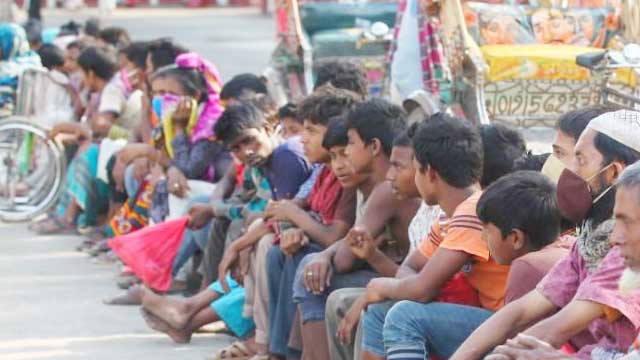The Centre for Policy Dialogue (CPD) has said it could not find specific allocation in the government’s bailout package for the marginalized people to fight the coronavirus outbreak.
Meanwhile, to ensure food and income security of the marginalized section of the society consequent to the Covid-19 pandemic, the think-tank proposed the government to provide households of 4-member families with Tk8,000 per month for the next two months.
CPD came up with the observation at an online briefing titled: “CPD’s Initial Assessment of Public Policy Interventions and Proposals for Food and Income Security of the Marginalized,” on Monday.
The briefing was aimed at talking on the bailout packages effectiveness, efficiency, implementation and result on the people.
"On March 25, the government created a credit line by forming a Tk5,000 crore revolving fund for the export-oriented sector to pay workers wages. Later, the government formed more four fund of Tk67,750 crore, and recently another of Tk5,000 crore for the agriculture sectors," CPD Executive Director Fahmida Khatun said in the briefing.
Needless to say, in these bailout packages, we did not see any specific allocation for the marginalized and vulnerable group, said Fahmida.
She further added that although Prime Minister Sheikh Hasina said that the government will ensure foods free of cost, selling rice on open market at Tk10 per kilogram and took measures for people like rickshawpullers.
“The vulnerable groups are relatively more exposed to the threat of Covid-19. But, they are yet to receive any organized support. As per the CPD data, 66% of the elderly population and 70.6% of children were not covered by any social protection measures.”
Meanwhile, 79.1% of women with newborns did not receive maternity benefits while 81.5% of people with disabilities were not protected by benefits.
“It is critically important to ensure food and income security of the marginalized section of the society consequent to the COVID-19 pandemic and subsequent disruptions of economic activities,” CPD Senior Research Fellow Towfiqul Islam Khan, said in his presentation.
People belonging to the lower income group, particularly those employed in the informal sector, and about 85% of total employed population of the economy are among the most vulnerable, said Towfiqul.
It is widely acknowledged that the “lockdown” strategy will only be successful if the state is able to protect its lower income population from hunger and provide food security to them, he added.
In view of the above, CPD proposed a new time-bound program towards food and income security of the marginalised population of Bangladesh.
The CPD suggested initial assessment of public policy interventions and proposals for food and income security of the marginalized, estimating the number of targeted citizen’s delivery of financial resources and ensuring good governance in the delivery.
To this end, among the employment categories, three groups are considered such as day labourer, paid employees and self-employed.
Considering the above, estimated number of target participants would be 17 million households (HHs), of which 17.4% are from urban areas employed with monthly income being less than Tk10,000 along with day and paid labour) under the lower case scenario, which will cover about 68.4 million citizens, the think-tank said.
On the other hand, 19 million HHs, of which 18.9% are from urban areas (considering self-employed with monthly income being less than Tk11,000 along with day and paid labour) under the higher case scenario which will cover about 75.7 million citizens, it added.
"We propose that these HHs are provided with Tk8,000 per month for two months (total Tk16,000). This is close to the lower poverty line, for a family of 4 members in today’s current prices,” said the economist.
Total financial requirement for the proposed cash transfer program has been estimated to be Tk26,962 crore or about 0.9% of GDP under the lower case scenario and Tk29,852 crore about 1% of GDP under the higher case scenario, he added.





